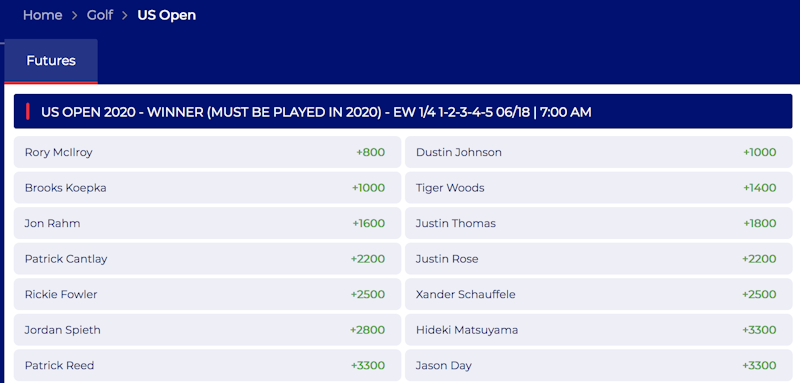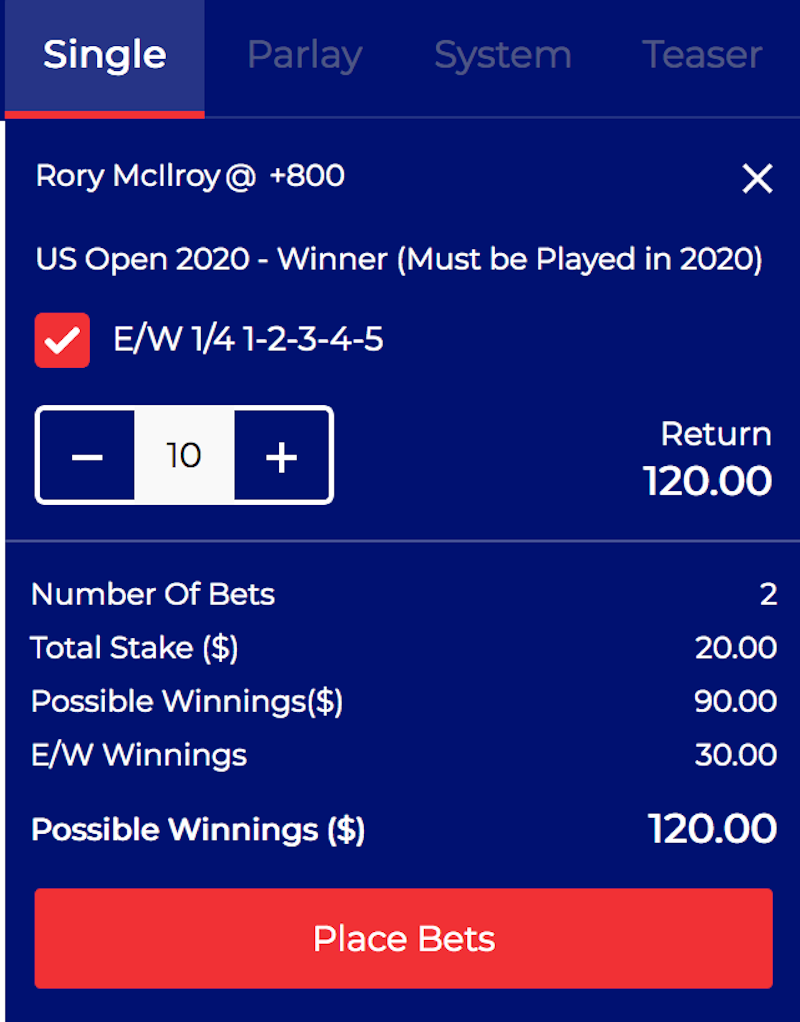
Justin Thomas of team USA tees off during Presidents Cup practice at Royal Melbourne Golf Club. (Photo by Speed Media/Icon Sportswire)
How to bet on golf
Golf is a complex sport, which can make betting difficult but also lucrative, if you can pinpoint the outcome of a particular tournament.
The four golf majors — the Masters, PGA Championship, U.S. Open, and Open Championship — draw both hard-core and casual fans, and they provide plenty of opportunities to cash in on the action. Many events on the PGA Tour and around the world are popular among bettors, as well, such as The Players Championship, Presidents Cup, and the Memorial Tournament.
Below is a guide to betting on golf, including an explanation of the each-way market and how to wager on futures and props.
What are the odds?
The odds set by a sportsbook indicate how likely a particular result will occur in a tournament or matchup. If you wanted to bet on the U.S. Open, golf’s third major of the season, you could find the odds for each golfer to win the tournament listed on the odds board.

What does the + and - mean?
The minus sign: The minus sign is associated with the favorite. The larger the number next to the minus sign, the more likely the favorite is to win. Typically, before the start of a tournament with a large field, you will not find a heavy favorite with short odds. As the tournament progresses, the probable winner of the tournament becomes more apparent, and the favorite’s odds will eventually get much lower.
The plus sign: The larger the number next to the plus sign, the less likely a player is to win. Betting a heavy underdog can result in a larger payout but also comes with greater risk.
What is the moneyline?
Pick which player you think will win a matchup or tournament.
How much will you win based on the odds?
The number next to the plus or minus sign designates how much money you would win based on a $100 bet.
Betting the favorite: Let's say Rory McIlroy and Justin Thomas are paired up in the first round of a tournament. McIlroy's odds to finish with a better score than Thomas are -130, while Thomas' odds to beat McIlroy's score are +120.
If you believe McIlroy (-130) will win the matchup, you would wager $130 to earn an additional $100, or a net of $230.
Betting the underdog: If you think Thomas (+120 odds) can top McIlroy's score, you would wager $100 to earn an additional $120, or a net of $220.
Note: You do not have to wager $100. You are free to go well below or above that number. The odds board simply uses the figure of 100 as a basis to communicate the odds.
Head-to-head betting
The above example is also considered head-to-head betting. With head-to-head betting, you can wager on a golfer to defeat another for the day or for the whole tournament. You can bet which will have the lower score at the end of the day or tournament, or which golfer will win particular holes during a round.
Match-play betting
Head-to-head betting is common with match play. The Ryder Cup, Presidents Cup, and WGC Match Play are examples of golf tournaments that follow a match-play scoring system, as opposed to a stroke-play system.
In match play, each hole is a separate competition, and the winner of the hole is determined by which player used the fewest number of strokes. Match play is more of a player-versus-player competition, whereas stroke play is player versus the course.

What is an each-way market?
With an each-way bet, you can double down on your pick to win by placing a bet on a golfer to land in first on the leaderboard or to finish high.

You can bet on McIlroy to win the U.S. Open outright, while also making an each-way bet for him to place in the top five.
If you placed $10 on McIlroy to win at +800 odds, you would bring in an $80 profit if he wins. If you also place an each-way bet, your $10 wager doubles to $20, and you will get $100 in profit if McIlroy comes in first ($80 for the win and $20 for the top five finish). If he finishes in the top 5 but does not come in first, you would earn $20.
Top nationality and other prop bets
You can find a variety of prop bets on golf tournaments, such as the nationality of the winner, or whether a hole in one will occur.
The U.S. Open has been dominated by Americans, while the Open Championship is far more diverse, with players from Italy, Ireland, the U.S., and Sweden all having won the event since 2015.
You can also wager on an outcome like the first-, second-, or third-round leader. With this type of bet, you predict which player will own the lead in the tournament at the conclusion of play for each day.
Top 5/10/20 betting
Golf is a mental game that can be swayed by a ton of variables, including weather, current form, or a player’s familiarity with the course. For that reason, picking an outright winner can require quite a bit of research and some luck.
If you feel confident in a golfer at a particular event but aren’t certain he or she can win, you can also wager on a top five, top 10, or top 20 finish. You’ll find the best odds on a top 5 finish, while a top 20 result will provide less value.
Since it’s difficult to forecast the champion of a golf tournament, you can better your chances of making money by viewing wider betting options, like those in this article.